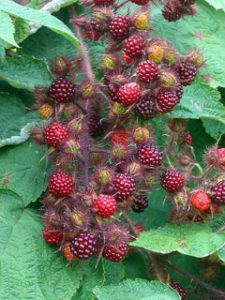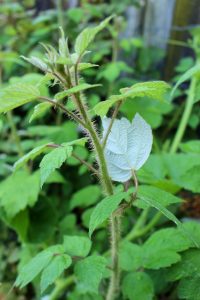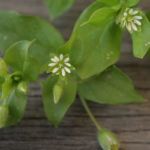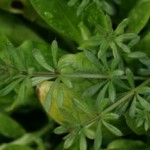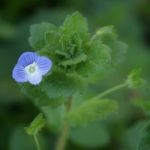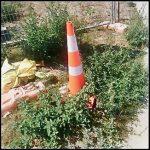Happy New Year Everyone!! This is my first post for 2019.
Japanese Wineberry or Wild Raspberry –Rubus phoenicolasius. Those of you who live in
the countryside may know and perhaps curse this rambunctious plant called Japanese wineberry or wild raspberry. Its protecting the land but also an opportunist with its vicious thorny stems, but it has sweet, delicious fruit. Rubus means bramble and phoenicolasius means with purple hairs, Latin names that describe this vigorous, aggressive, scrambling, suckering perennial bramble in the rose family. Dense bristly-hairy, reddish, woody stems root when they touch the ground, enabling them to march across their chosen scrub gullies, or forest/bush and margins, along roadsides or even in a garden (Blackberries are closely related). The leaves are in threes on a stem with a big oval one at the tip and two smaller ones below all being green on top with silvery white undersides. The flowers are
white like mini roses.
I transplanted a plant from the farm (where one year I harvested ice cream containers of beautiful orange-red to dark red raspberry fruits) to my garden in Greerton. By the second spring my plant growing against a fence, sent out huge aggressive, arching stems blocking the path. I pruned them hard, reminding the plant it
was in suburbia not the wilds. It has fruited prolifically during December and early January, sooner than the late January, early February fruiting at 300m on Belk Road South. Next year I’ll net it as the birds love the fruit too.
Fossils show that wild raspberries have been part of our diet for centuries, Propertius (c.50-16BC) a Roman poet mentioned them. It wasn’t until the sixteenth century that the raspberry was first cultivated. It has long been valued as a remedy for all sorts of illnesses. Europeans in the seventeenth century made the fruit into a syrup to prevent vomiting and the fresh fruit was recommended to remove tartar from teeth.
Raspberry leaf is still very much prescribed by herbalists today especially for women. My favourite herbalist Juliette de BaÏracli Levy says wild raspberries are more potent than cultivated ones, although all contain an active principle Fragrine
that tones the uterine muscles. She recommends the fruit and leaves as tea throughout pregnancy supporting the health of mother and baby and to ease childbirth. It will also bring down retained afterbirth. Juliette says it is an acclaimed remedy for sterility in men (also being a tonic for bulls and stallions) and women and will ease morning sickness1 and painful periods.
Raspberry leaf has other uses and I make a tea every night with one leaflet and a few hawthorn berries as a relaxing sleep remedy. A few sips if I wake and I fall back to sleep. The leaves contain magnesium, potassium, iron, vitamins A, C & B1. It has astringent properties as well that treat dysentery and diarrhoea and fevers in infants. With all these wonderful properties perhaps this enthusiastic plant deserves greater appreciation.
1 The Illustrated Herbal Handbook by de BaÏracli Levy,J., 1974, Faber & Faber, London
